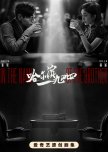Younu Senki
In the Name of the Brother is a butterfly struggling to break free from the grounded life of a caterpillar. It failed. But, oh, what coulda been!
It’s 1944, and Nippon’s teikoku is on its last legs. Ah la Gramsci, the Japanese Order was dying and a new world struggling to be born. We meet Gan Xue and the Song brothers as the remnants of the Japanese Kwantung army, Manchuko patriots, Guomindang agents and Communists struggle for power in an age of monsters. One-third of the story is an undifferentiated mess of assassinations, kidnappings and torture.
The third of the story about the Song brothers — Communist Agents Extraordinary — was the weakest and most frustrating part due to excessive plot armour except when the writers decided to scapegoat Gan Xue as the show’s villain. A particularly egregious intervention by the ghost in the machine in Episode 25 was so terrible that I spent minutes after the credits hysterically laughing. That said, Qin Hao elevated the role, as expected, and the tech they used to achieve the twinning effect was. . . impressive. I still do not understand what other purpose making the secondary protagonists twins had besides trying to make Gan Xue the villain! But that’s why I don’t make the big bucks.
Luckily Gan Xue saves the day. Best girl is stylish, not the smartest but competent. Most importantly for the world she inhabits, she is tenacious and ruthless. The subplot of what is an otherwise straightforward tragic arc is that her life was shaped by the many betrayals by all the men in her life. She yearned for family but lost it all in the end, fated to end her days in gaol.
It’s annoying that the writers gave what were very likeable characters an ending more bitter than all that gall Goujian ate to remember to delete Wu from history. They really tried to portray fleeing to Japan with a pretty girl and a bag of gold as the wrong idea! Then dared to end with literal flag-waving scenes. Nah, bro. Some people deserve the Jin Yi Wei.
So, I’m torn. How does one rate a bad story with great characters?
Oh well. At least the soundtrack was superb, and the casting was superb except for one notable exception. Alas, this was one of those directors in love with auteur shooting styles. The man was going for metaphors and unreliable narrator techniques. Too much, chief. Too much!
It’s 1944, and Nippon’s teikoku is on its last legs. Ah la Gramsci, the Japanese Order was dying and a new world struggling to be born. We meet Gan Xue and the Song brothers as the remnants of the Japanese Kwantung army, Manchuko patriots, Guomindang agents and Communists struggle for power in an age of monsters. One-third of the story is an undifferentiated mess of assassinations, kidnappings and torture.
The third of the story about the Song brothers — Communist Agents Extraordinary — was the weakest and most frustrating part due to excessive plot armour except when the writers decided to scapegoat Gan Xue as the show’s villain. A particularly egregious intervention by the ghost in the machine in Episode 25 was so terrible that I spent minutes after the credits hysterically laughing. That said, Qin Hao elevated the role, as expected, and the tech they used to achieve the twinning effect was. . . impressive. I still do not understand what other purpose making the secondary protagonists twins had besides trying to make Gan Xue the villain! But that’s why I don’t make the big bucks.
Luckily Gan Xue saves the day. Best girl is stylish, not the smartest but competent. Most importantly for the world she inhabits, she is tenacious and ruthless. The subplot of what is an otherwise straightforward tragic arc is that her life was shaped by the many betrayals by all the men in her life. She yearned for family but lost it all in the end, fated to end her days in gaol.
It’s annoying that the writers gave what were very likeable characters an ending more bitter than all that gall Goujian ate to remember to delete Wu from history. They really tried to portray fleeing to Japan with a pretty girl and a bag of gold as the wrong idea! Then dared to end with literal flag-waving scenes. Nah, bro. Some people deserve the Jin Yi Wei.
So, I’m torn. How does one rate a bad story with great characters?
Oh well. At least the soundtrack was superb, and the casting was superb except for one notable exception. Alas, this was one of those directors in love with auteur shooting styles. The man was going for metaphors and unreliable narrator techniques. Too much, chief. Too much!
Was this review helpful to you?







